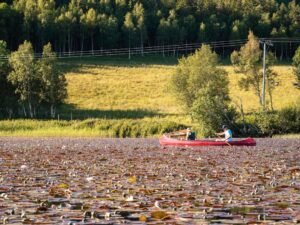

Norwegian for Journalists: Master Reporting Skills
Are you a journalist working in Norway or aspiring to work in the vibrant field of journalism in this Scandinavian country? Have you ever wondered how mastering the Norwegian language can enhance your reporting skills and open doors to new opportunities? Whether you are conducting interviews, writing captivating articles, or building relationships with sources, having a strong command of Norwegian is essential for success in the industry.
In this article, we will introduce our comprehensive course on Norwegian for Journalists, designed specifically to help you develop the language skills necessary to excel in your reporting career in Norway. From expanding your vocabulary to understanding the unique nuances of journalism in this country, our course covers the essential knowledge you need to navigate the local landscape with confidence.
Table of Contents
ToggleKey Takeaways:
- Mastering the Norwegian language is crucial for journalists working in Norway.
- Enhancing your language skills can elevate your communication and reporting abilities.
- Language proficiency can help you build better relationships and gather accurate information.
- Writing and reporting in Norwegian require specific techniques and approaches.
- Expanding your Norwegian vocabulary for journalism purposes is essential for success.
Learn Norwegian to Enhance Your Journalism Skills
As a journalist working in Norway, learning the Norwegian language is essential for your professional growth. Developing strong Norwegian language skills can significantly enhance your communication and reporting abilities, allowing you to connect more effectively with sources and navigate the local journalistic landscape.
By expanding your language proficiency, you gain access to a wider range of news stories and sources, enabling you to provide in-depth coverage and unique perspectives that resonate with the local audience. Learning Norwegian also demonstrates your commitment to understanding the nuances of Norwegian society and culture, building trust and credibility among your readers.
Language training for journalists offers a comprehensive approach to learning Norwegian, specifically tailored to the needs of reporters. Through specialized courses, you can acquire the language skills required to conduct interviews, gather information, and write articles in Norwegian.
| Benefits of Learning Norwegian for Journalism | Enhanced Communication | Improved Reporting |
|---|---|---|
| Unlock new sources and stories | Build stronger relationships with sources | Deliver accurate and nuanced reports |
| Gain insights from local experts | Negotiate interviews more effectively | Understand local context and nuances |
| Increase professional opportunities | Establish rapport with interviewees | Produce engaging and compelling content |
By studying Norwegian phrases and vocabulary related to journalism, you can quickly adapt to the language demands of the field, ensuring smooth and accurate communication. It’s crucial to invest time and effort into language learning to bridge the linguistic gap and effectively convey information to your target audience.
Whether you are new to the Norwegian language or seeking to refine your existing skills, enrolling in a journalism-oriented language course can provide the necessary training and resources to help you excel in your journalistic endeavors in Norway.
The Role of Language in Journalism in Norway
Language plays a vital role in journalism, and this is especially true in Norway. As a journalist, being proficient in the Norwegian language can significantly enhance your communication skills and strengthen your ability to gather accurate information.
Building solid relationships with sources is crucial for journalists, and speaking their language can be a game-changer. By speaking Norwegian, you can establish a deeper connection with sources, gain their trust, and obtain valuable insights that might otherwise remain hidden.
Moreover, understanding the local context is essential for reporting effectively in Norway. By being fluent in Norwegian, you can navigate societal nuances, cultural subtleties, and political landscapes more accurately. This deeper understanding will allow you to provide readers with comprehensive and nuanced coverage that goes beyond surface-level information.
Journalism in Norway requires journalists to be familiar with the intricacies of the language. Whether it’s conducting interviews, writing articles, or understanding official documents, mastering Norwegian allows you to deliver accurate and impactful news stories that resonate with the local audience.
Being proficient in the Norwegian language gives journalists a significant edge in reporting. It enables them to delve into the heart of the matter, comprehend the nuances, and share stories that truly reflect the reality of the Norwegian people.
By honing your communication skills through language training, you can elevate your journalism career in Norway to new heights. Investing your time and effort in learning Norwegian is an investment in your professional development and the quality of your journalistic work.
Writing and Reporting in Norwegian
When it comes to journalism in Norway, the ability to effectively write and report in Norwegian is essential. By crafting your articles in Norwegian, you can reach a wider audience and better connect with the local communities that you report on. Additionally, having expertise in reporting in Norway allows you to understand the nuances of the culture, politics, and society, enabling you to provide accurate and insightful coverage.
When writing in Norwegian, it’s important to employ techniques that capture readers’ attention and convey information clearly. Use descriptive language and storytelling elements to engage your audience and make your articles stand out. Incorporating quotes and anecdotes from local sources can add depth and authenticity to your reporting. Remember to maintain journalistic integrity by fact-checking and verifying information before publishing.
Conducting interviews in Norwegian presents its own set of challenges. Ensure that you have a good understanding of the language, especially when it comes to complex subjects or technical jargon. Take the time to build rapport with your interviewees, as this can help elicit more meaningful and detailed responses. Active listening and asking follow-up questions will enable you to gather the necessary information for your stories.
Navigating the unique journalistic landscape in Norway requires an understanding of the media industry and its ethical guidelines. Familiarize yourself with the Norwegian press ethics code, which emphasizes principles such as accuracy, independence, and respect for privacy. Adhering to these guidelines will help you build trust with your audience and sources, enhancing the credibility of your reporting.
Crafting Compelling Articles in Norwegian
When crafting your articles in Norwegian, consider the following tips:
- Utilize vivid language and imagery to paint a vivid picture for your readers.
- Structure your articles with a clear introduction, body, and conclusion.
- Include relevant statistics, data, or expert opinions to support your claims.
- Add relevant quotes from local sources to provide diverse perspectives.
“Writing in Norwegian allows journalists to connect with the local communities they report on and provide accurate coverage that resonates with readers.”
Conducting Interviews in Norwegian
When conducting interviews in Norwegian, keep in mind the following:
- Prepare questions in advance and ensure they are clear and concise.
- Listen actively and ask follow-up questions to gather comprehensive information.
- Be culturally sensitive and respect the interviewee’s boundaries.
- Take accurate notes or record the interview with permission for reference.
Navigating the Journalistic Landscape in Norway
To navigate the unique journalistic landscape in Norway, remember these key points:
- Familiarize yourself with the Norwegian press ethics code and adhere to its principles.
- Stay informed about current events and the political landscape in Norway.
- Build relationships with local sources and establish trust through ethical reporting.
| Techniques for Writing and Reporting in Norwegian | Benefits |
|---|---|
| Using descriptive language and storytelling elements | Engages readers and makes articles more memorable |
| Incorporating quotes and anecdotes from local sources | Provides authenticity and diverse perspectives |
| Understanding the media industry and its ethical guidelines | Builds credibility and trust with audience and sources |
Expanding Your Norwegian Vocabulary for Journalism
In this section, we will provide you with valuable tips and resources to expand your Norwegian vocabulary specifically for journalism purposes. By learning essential phrases, common industry terms, and implementing effective strategies for continuous language improvement, you will enhance your ability to communicate and report effectively in Norway.
Essential Phrases
Becoming familiar with key phrases in Norwegian is essential for conducting interviews, building relationships with sources, and navigating the journalism landscape in Norway. Here are some phrases that every journalist should know:
- “Kan jeg intervjue deg?” – May I interview you?
- “Hva er din mening om dette?” – What is your opinion on this?
- “Kan du forklare dette nærmere?” – Can you explain this further?
- “Hva er siste nytt?” – What’s the latest news?
- “Kan jeg få et sitat?” – Can I get a quote?
Common Industry Terms
Being familiar with industry-specific terms is crucial for accurate reporting in Norway. Here are some common terms used in the field of journalism:
- Nyheter – News
- Artikkel – Article
- Redaksjon – Editorial
- Kilde – Source
- Pressekonferanse – Press conference
Strategies for Continuous Language Improvement
Improving your Norwegian language skills requires consistent effort and practice. Here are some strategies to help you continuously enhance your vocabulary:
- Immerse Yourself: Surround yourself with Norwegian media, such as newspapers, TV shows, and podcasts, to expose yourself to the language on a daily basis.
- Practice with Native Speakers: Engage in conversations with native Norwegian speakers to improve your fluency and learn new words and expressions.
- Use Language Learning Apps: Utilize language learning apps and software that offer interactive lessons and exercises tailored to your level.
- Create Flashcards: Make flashcards with new words and review them regularly to reinforce your vocabulary.
“Expanding your Norwegian vocabulary for journalism is crucial for effective reporting in Norway. By learning essential phrases, familiarizing yourself with industry terms, and implementing effective language learning strategies, you will become a more skilled and confident journalist in the Norwegian context.”
| Vocabulary Category | Example Words |
|---|---|
| Politics | Regjering (government), Stortinget (parliament), Statsminister (prime minister) |
| Sports | Fotball (football), Skiløp (skiing), Håndball (handball) |
| Environment | Klimaendringer (climate change), Miljøvern (environmental conservation), Bærekraftighet (sustainability) |
With these tips, resources, and an expanded Norwegian vocabulary, you’ll be better equipped to navigate the journalism industry in Norway, foster meaningful connections, and produce high-quality reports. So, start practicing and expanding your language skills today!
Conclusion
Mastering the Norwegian language is crucial for journalists working in Norway. Throughout this article, we have explored the significance of learning Norwegian and how it can enhance your journalism skills. Communication plays a vital role in journalism, and being proficient in Norwegian allows you to build stronger relationships with sources and gather accurate information.
Writing and reporting in Norwegian can be challenging, but with the right techniques, you can craft compelling articles and conduct effective interviews. Expanding your Norwegian vocabulary specifically for journalism purposes is also essential. With the knowledge of essential phrases and industry terms, you can navigate the unique journalistic landscape of Norway with ease.
To help you achieve these goals, our course on Norwegian for Journalists offers comprehensive training that focuses on developing the necessary language skills and reporting abilities. By enrolling in our course, you will gain a competitive edge in the field and be well-equipped to excel in journalism in Norway.
FAQ
Will this course help me become fluent in Norwegian?
While this course is designed to improve your Norwegian language skills, becoming fluent requires continuous practice and immersion. However, our course will equip you with the necessary foundation and knowledge to communicate effectively as a journalist in Norway.
Is this course suitable for beginners or intermediate learners?
Our course is tailored to cater to all levels of language proficiency. Whether you are a beginner starting from scratch or an intermediate learner looking to enhance your skills, our curriculum is designed to accommodate your needs and help you progress.
How will learning Norwegian enhance my journalism skills in Norway?
Speaking and understanding Norwegian will enable you to build better relationships with sources, conduct interviews more effectively, and navigate the local context with ease. It will also open up opportunities for you to cover a wider range of topics and connect more deeply with your audience.
Can I apply the language skills I learn in this course to other areas besides journalism?
Absolutely! The language skills you acquire through our course can be applied to various aspects of life in Norway, including social interactions, cultural immersion, and everyday communication. Additionally, being proficient in Norwegian can create new personal and professional opportunities outside of journalism.
Are there any additional resources or support available throughout the course?
Yes, we provide supplementary materials, such as vocabulary lists, grammar guides, and recommended reading materials, to support your learning journey. Our instructors are also available to answer any questions and provide guidance and feedback as you progress through the course.
Can I take this course remotely, or is it only available in-person?
Our course is designed to be flexible and accessible. You can choose to take the course entirely online, allowing you to learn at your own pace and from anywhere in the world. Alternatively, we also offer in-person sessions for those who prefer a more immersive learning experience.
If you want to learn Norwegian, you can register for classes here. We look forward to hearing from you and helping you become fluent in Norwegian.





